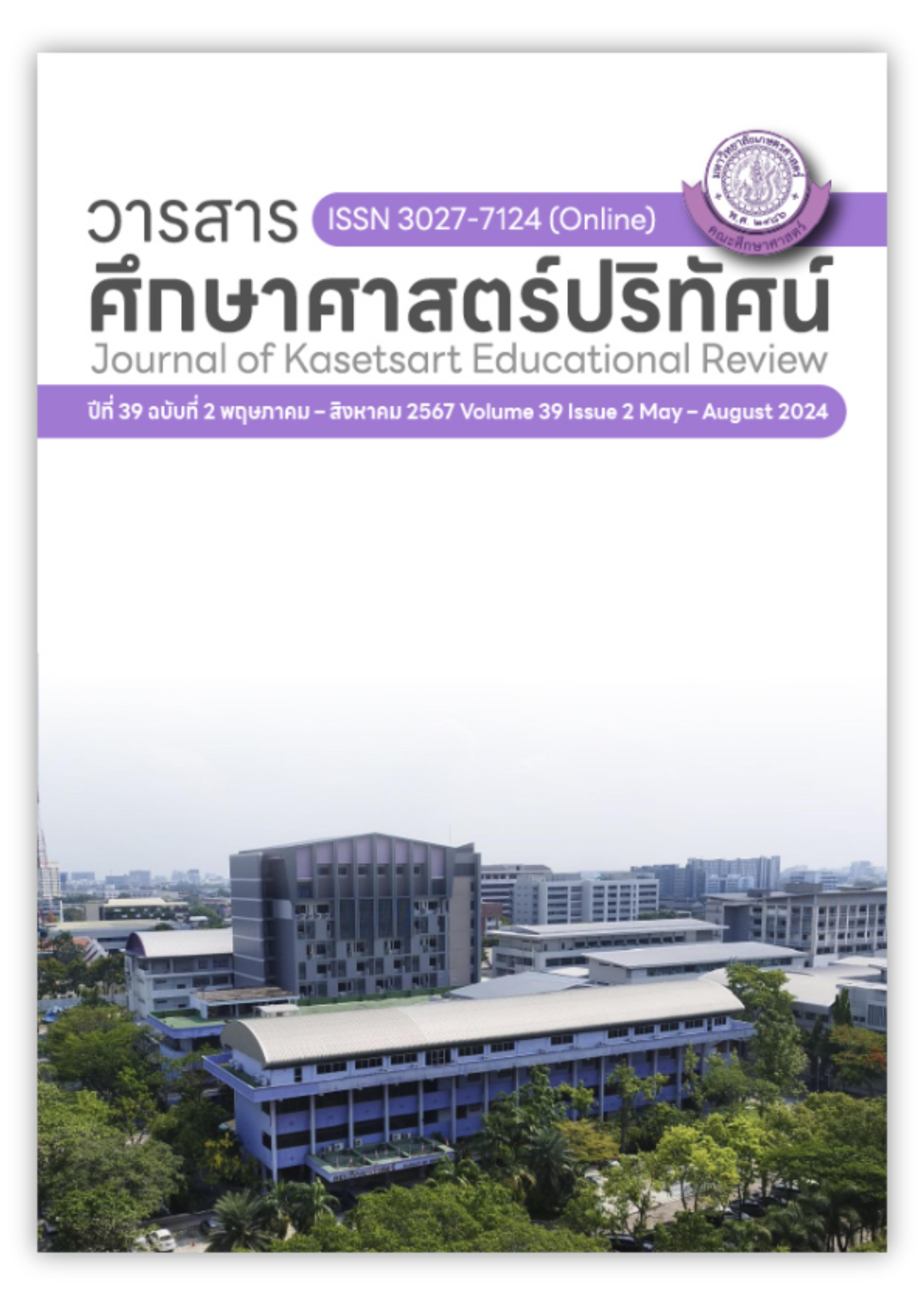ผลของกิจกรรมแนะแนวตามแนวคิดการเรียนรู้แบบร่วมมือเพื่อเสริมสร้างการรู้เท่าทัน สื่อดิจิทัลของนักเรียนระดับมัธยมศึกษาตอนต้น
คำสำคัญ:
กิจกรรมแนะแนวตามแนวคิดการเรียนรู้แบบร่วมมือ, การรู้เท่าทันสื่อดิจิทัล, นักเรียนระดับมัธยมศึกษาตอนต้นบทคัดย่อ
งานวิจัยนี้มีวัตถุประสงค์ 1) เพื่อศึกษาระดับการรู้เท่าทันสื่อดิจิทัลของนักเรียนระดับมัธยมศึกษาตอนต้น และ 2) เพื่อศึกษาผลของกิจกรรมแนะแนวตามแนวคิดการเรียนรู้แบบร่วมมือเพื่อเสริมสร้างการรู้เท่าทันสื่อดิจิทัลของนักเรียนระดับมัธยมศึกษาตอนต้น การดำเนินการวิจัยแบ่งเป็น
2 ระยะ คือ ระยะที่ 1 การศึกษาการรู้เท่าทันสื่อดิจิทัลของนักเรียนมัธยมศึกษาตอนต้น กลุ่มตัวอย่าง คือ นักเรียนมัธยมศึกษาตอนต้น 428 คน ปีการศึกษา 2566 ระยะที่ 2 การทดลองใช้กิจกรรมแนะแนวตามแนวคิดการเรียนรู้แบบร่วมมือเพื่อเสริมสร้างการรู้เท่าทันสื่อดิจิทัลของนักเรียนระดับมัธยมศึกษาตอนต้น กลุ่มตัวอย่างเป็นกลุ่มเดียวกับกลุ่มตัวอย่างในระยะที่ 1 จำนวน 24 คน สุ่มอย่างง่ายโดยการ จับสลาก เป็นกลุ่มทดลอง 12 คน กลุ่มควบคุม 12 คน เครื่องมือที่ใช้ 1) แบบวัดการรู้เท่าทันสื่อดิจิทัล 2) กิจกรรมแนะแนวตามแนวคิดการเรียนรู้แบบร่วมมือ วิเคราะห์ข้อมูลระยะที่ 1 ด้วยค่าร้อยละ และค่าเปอร์เซ็นต์ไทล์ ระยะที่ 2 วิเคราะห์ข้อมูลด้วยสถิติ Wilcoxon signed rank test สถิติ Mann-Whitney U test การวิเคราะห์หาค่าเฉลี่ย ค่าเบี่ยงเบนมาตรฐานและคะแนนเพิ่มสัมพัทธ์
ผลการวิจัยสรุปว่า 1) กลุ่มตัวอย่างส่วนใหญ่มีระดับการรู้เท่าทันสื่อดิจิทัลอยู่ในระดับปานกลาง 2) กลุ่มทดลองที่เข้าร่วมกิจกรรมแนะแนวตามแนวคิดการเรียนรู้แบบร่วมมือมีคะแนนการรู้เท่าทันสื่อดิจิทัลสูงขึ้นกว่าก่อนเข้าร่วมกิจกรรมอย่างมีนัยสำคัญทางสถิติที่ระดับ .05 และ 3) กลุ่มทดลองที่เข้าร่วม กิจกรรมแนะแนวตามแนวคิดการเรียนรู้แบบร่วมมือมีคะแนนการรู้เท่าทันสื่อดิจิทัลสูงกว่ากลุ่มควบคุมอย่างมีนัยสำคัญทางสถิติที่ระดับ .05
เอกสารอ้างอิง
American Library Association Digital Literacy Taskforce. (2011). Digital Literacy. https://literacy.ala.org/digital-literacy/
Bawden, D., & Robinson, L. (2012). Digital literacy. In Introduction to Information Science. (pp. 287-302). London: Facet Publishing.
Bunmahome, J. (2019). Principles of guidance and student development. Nakhon Pathom Faculty of Education Nakhon Pathom Rajabhat University. [in Thai].
Buranachai, C. & Onchaiuea, P. (2021). Study of the results of using guidance activities using cooperative learning concept to develop creative problem-solving thinking of mathayom 4 students at Setthabutbamphen school. Nakhon Ratchasima College Journal, 15(3), 1-12. [in Thai].
Chuasathapanasiri, T., Somlok, A., & Thanarak, R. (2019). A guide to knowing about online media and watching out for media that is not safe for children and youth. Bangkok: First Offset Printing Company. [in Thai].
Ebsuksiri. A. (2013). Psychology for teachers. Bangkok, Chulalongkorn University Press. [in Thai].
Electronic Transactions Development Agency. (2022). Report on the results of a survey of internet user behavior in Thailand year 2022. https://www.etda.or.th/getattachment/ 78750426-4a58-4c36-85d3-d1c11c3db1f3/IUB-65-Final.pdf.aspx. [in Thai].
Khaemmanee, T. (2014). Teaching science, knowledge for organizing an effective learning process. (18th ed.). Bangkok: Chulalongkorn University Press. [in Thai].
Khamcharoen, P. & Phonnikornkit, W. (2018). Digital literacy: evolution, meaning, and synthesis of skills. Journal of Information Science and Applied Technology. 1(2), 72-81. [in Thai].
Krejcie, R. V., & Morgan, D. W. (1970). Determining sample size for research activities. Educational and Psychological Measurement, 30(3), 607–610.
Kulnaphadon, P. (2019). Adolescent Counseling. (4 th ed.). Chonburi: Get Good Creation Company Limited. [in Thai].
Rambousek, V.; Štípek, J. & Vaňková, P. (2016). Contents of Digital Literacy from the Perspective of Teachers and Pupils. Future Academy Multidisciplinary Conference, 217, 354-362.
Rodrigo, R., & Purzycki, K. (2013). Making learning reel: Student-made videos on mobile devices. En E. G. Smyth & J. X. Volker (Eds.), Enhancing Instruction with Visual Media: Utilizing Video and Lecture Capture. (pp. 266-279). Information Science Reference, an imprint of IGI Global.
Satchanan, C. (2020). Information intelligence in the digital environment. Journal of Social Sciences and Humanities, 46(1), 1-17. [in Thai].
Techataweewan, W. & Prasertsin, A. (2019). "Digital Literacy." Encyclopedia of Education. Faculty of Education Srinakharinwirot University. 54 (1): 38-48. [in Thai].
UNESCO. (2018). A Global Framework of Reference on Digital Literacy Skills for Indicator 4.4.2. UNESCO Institute for Statistics. University Press.
ดาวน์โหลด
เผยแพร่แล้ว
ฉบับ
ประเภทบทความ
สัญญาอนุญาต
ลิขสิทธิ์ (c) 2024 วารสารศึกษาศาสตร์ปริทัศน์

อนุญาตภายใต้เงื่อนไข Creative Commons Attribution-NonCommercial-NoDerivatives 4.0 International License.
บทความทุกบทความเป็นลิขสิทธิ์ของวารสารคณะศึกษาศาสตร์ มหาวิทยาลัยเกษตรศาสตร์ วิทยาเขตบางเขน
วารสารศึกษาศาสตร์ปริทัศน์ (Kasetsart Educational Review)






